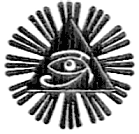|
The
Ophites (from the Greek word ophis, “serpent”)
reinterpreted the mythological theme of the Fall of Man in Genesis.
According to the Ophite view, the serpent of the Garden of Eden wanted
Adam and Eve, the first man and woman, to eat from the tree of knowledge
(gnosis) so that they would know their true identities and “be like God”
(Genesis 3:5). The serpent, thus, is interpreted as a messenger of the
spiritual God, and the one who wanted to prevent Adam and Eve from eating
the fruit of the tree of knowledge is viewed as the Demiurge. In their
rejection of the God of the Old Testament, who gave the Ten Commandments,
the Ophites flaunted their sexual freedom from the law and conventionality
by extreme sexual license, a trait common to other Gnostic groups as well. (from the Greek word ophis, “serpent”)
reinterpreted the mythological theme of the Fall of Man in Genesis.
According to the Ophite view, the serpent of the Garden of Eden wanted
Adam and Eve, the first man and woman, to eat from the tree of knowledge
(gnosis) so that they would know their true identities and “be like God”
(Genesis 3:5). The serpent, thus, is interpreted as a messenger of the
spiritual God, and the one who wanted to prevent Adam and Eve from eating
the fruit of the tree of knowledge is viewed as the Demiurge. In their
rejection of the God of the Old Testament, who gave the Ten Commandments,
the Ophites flaunted their sexual freedom from the law and conventionality
by extreme sexual license, a trait common to other Gnostic groups as well.
The
Phibionites in Alexandria were a
Gnostic sect
described by
St. Epiphanius in Alexandria were a
Gnostic sect
described by
St. Epiphanius of Salamis
of Salamis . They gathered at banquets that
became ecstatic orgies. Married couples changed partners for dramatic
sexual performances. Semen and menstrual blood were gathered and offered
as a gift to God before being consumed as the Body and Blood of Christ. By
such erotic communions they sought to re-gather the elements of the
world-soul (psyche) from the material forms into which it had been
dispersed through a cosmic tragedy at the beginning of time. The re-gathering
amounted to salvation, for all things would be gathered up into the one
glorious body of Christ. . They gathered at banquets that
became ecstatic orgies. Married couples changed partners for dramatic
sexual performances. Semen and menstrual blood were gathered and offered
as a gift to God before being consumed as the Body and Blood of Christ. By
such erotic communions they sought to re-gather the elements of the
world-soul (psyche) from the material forms into which it had been
dispersed through a cosmic tragedy at the beginning of time. The re-gathering
amounted to salvation, for all things would be gathered up into the one
glorious body of Christ.
|
 BACK
BACK
 BACK
BACK



